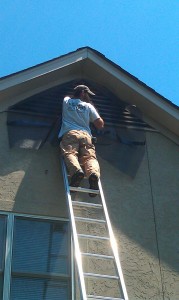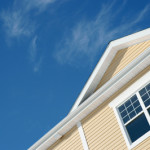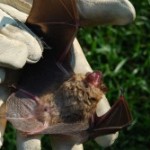North Carolina Bats in the Attic, Part 2
Bat Removal in Denver NC
If you live in North Carolina, bats in the attic or any other area of your residence may do more than put your health at risk or detract from the serenity of your home; they may cause damage to your property and the stench of living with the unwelcome guests may drive you batty.
How do you know if you have a bat infestation?
Perhaps you suspect that bats have slyly nested within the confines of your home, but you don’t want to risk crawling around in your attic to prove your theory correct. ( In addition to being kind of gross, contact with bats and their droppings, or guano, can put you at risk of contracting diseases).
The list below outlines some key clues that the International Association of Home Inspectors (InterNACHI) lists as indicators of a home bat infestation:
Noises such as squeaking, scratching and crawling in attics and walls a bit before dusk and dawn may indicate that you have bats in your home.
Accumulation of guano (bat droppings): Though guano may look similar to that of rodent droppings, bat excrement is unique in that it clumps together at the exit of bats’ roost, crumbles easily, and often has a sparkly appearance due to the digestion of insect wings.
Pungent odor caused by bat excrement: There is no escaping the foul smell of bat droppings, and the longer you wait to take care of the problem, the stronger the odor will become.
Creamy stains on windows may be caused by bat urine.
Stains around small openings in your home such as eaves and crevices may indicate a problem since tiny openings are often the point of entry for bats, creatures that are small and can easily squeeze through tiny spaces.
Dirt and grime may appear around the entryway of bats’ roosts.
How can bats cause damage to the home?
Bats do not gnaw through the structure of your home like some unwanted visitors such as rats, but their excrement can build in your attic or the walls of your home over time, which can create a noxious odor that can make one’s house almost unlivable and can detract from the value of the residence. In addition to creating a foul odor, guano can be corrosive and may cause damage to the walls of your home.
Typically, insurance doesn’t cover the damage caused by buildup of bat excrement and some people have returned to their vacation homes to find that an accumulation of guano has made the home uninhabitable.
Don’t ignore the problem:
Bats are interesting creatures to admire from afar and can provide excellent natural insect control, but being up close and personal with these winged mammals can wreak havoc on your home. It is imperative to be vigilant in the detection of bat infestation of your North Carolina home, and if you do discover that you’re sharing your abode with bats, it is important that you address the problem in a timely manner. If you do believe that you have bats roosting within your residence, you need to take heed since bats can put you and your family at risk of contracting diseases and they can cause damage to your home over time.
One would be wise to follow the Humane Society’s advice: “Successfully evicting bats can be challenging. A knowledgeable professional who understands bat behavior and laws protecting bats may be your best option.”
SOURCES:



